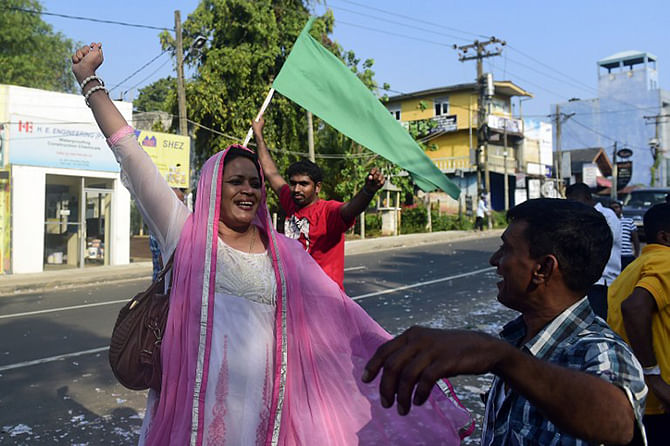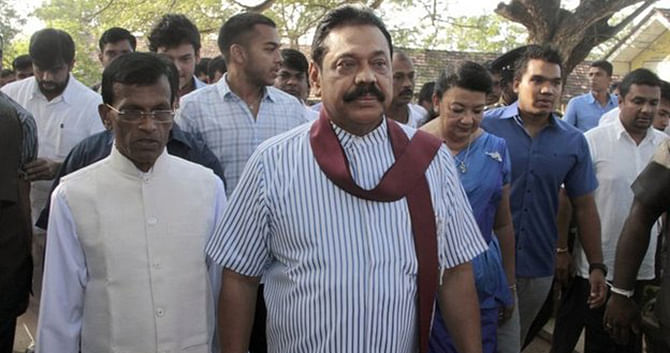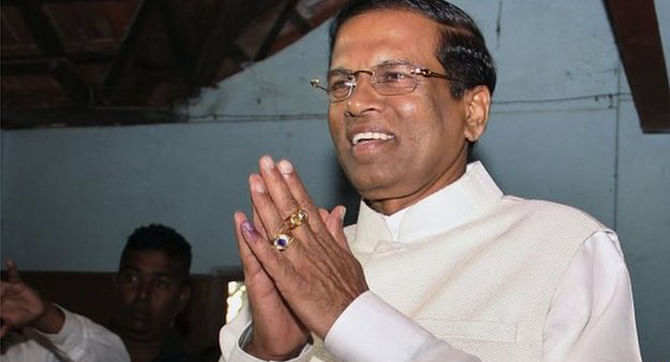Rajapaksa suffers shock election defeat

Sri Lanka's long-time leader Mahinda Rajapaksa has been defeated in the presidential election.
Official results showed Maithripala Sirisena, a former ally of the incumbent, had won 51.3% of the vote.
Rajapaksa, in office since 2005, said on Twitter he looked forward to a peaceful transition of power.

His supporters credit him with ending the civil war and boosting the economy, but critics say he had become increasingly authoritarian and corrupt.
Sirisena had already received promises of support from Tamil and Muslim leaders before the election.
But the result shows he also picked up a significant portion of the majority Sinhalese vote, most of whom solidly supported Rajapaksa in previous elections.
I value and respect our democratic process and the people’s verdict, and look forward to the peaceful transition of power. -MR
— Mahinda Rajapaksa (@PresRajapaksa) January 9, 2015
Sri Lanka opposition candidate takes early lead in presidential vote: COLOMBO (Reuters) - The Sri Lankan oppos... http://t.co/Pb19FiIfbS
— mobileauto (@mobileauto) January 9, 2015
Sirisena, who is due to be sworn in at 18:00 (12:30 GMT), was surrounded by supporters and photographers as he left his offices earlier.
"We must allow all Sri Lankans to enjoy this victory, therefore avoid hurting or insulting people," he said.

"I ask for everyone's support to take this process forward with compassion and love."
The incumbent was seeking a third term in office after he changed the constitution to scrap the two-term limit.
But before the results were announced, Rajakpaksa's press officer said the president "concedes defeat and will ensure a smooth transition of power bowing to the wishes of the people".
Both Rajapaksa and Sirisena are Sinhalese, the majority ethnic group in Sri Lanka.
They were allies until November when Sirisena, the health minister in Rajapaksa's government, announced his surprise candidacy.
Many in Sri Lanka are stunned by these events - not just because they have a new president, but because democracy has worked and there has been so little of the vote rigging, intimidation and election violence of the past, reports the BBC's Jill McGivering.
High Tamil Turnout
Turnout in many areas was above 70%, roughly in line with previous elections, with no reports of major incidents disrupting the voting process.
In Jaffna and Trincomalee, two of the main Tamil strongholds, turnout was higher than previous national elections.
The build-up to Sri Lankan elections is usually blighted by dozens of deaths, but this year just one election-related death was reported.
Sri Lanka opposition challenger for presidency takes a strong lead in early results http://t.co/EUH7RP3mng pic.twitter.com/kavxjXvXGz
— AJE News (@AJENews) January 9, 2015
Rajapaksa was last elected in 2010 when he defeated his former army chief Sarath Fonseka, who was later jailed on charges of implicating the government in war crimes.
But his critics say he became increasingly authoritarian and failed to tackle the legacy of Sri Lanka's civil war, which left the Tamil areas in the north impoverished and embittered.
Both sides in the war were accused of atrocities, but an inquiry set up by the government that largely exonerated the army was dismissed by rights groups as flawed.
Yogita Limaye, BBC News, Colombo.
Less than two months ago, when the president called snap elections, this outcome was unimaginable. There was no big opposition candidate in sight. Then suddenly Sirisena, then the health minister, switched sides, propped up by heavyweight politicians and later supported by many minority groups.
Sirisena has a quiet demeanour, unlike the flamboyant Rajapaksa. His manifesto contained a schedule of when he would deliver on his agenda. The main pledge he made was that he would end what he called the unlimited powers of the president. Given that he has been backed by a variety of political parties and groups, one of his main challenges will be to live up to the promises he has made to all of them.

 For all latest news, follow The Daily Star's Google News channel.
For all latest news, follow The Daily Star's Google News channel. 



Comments